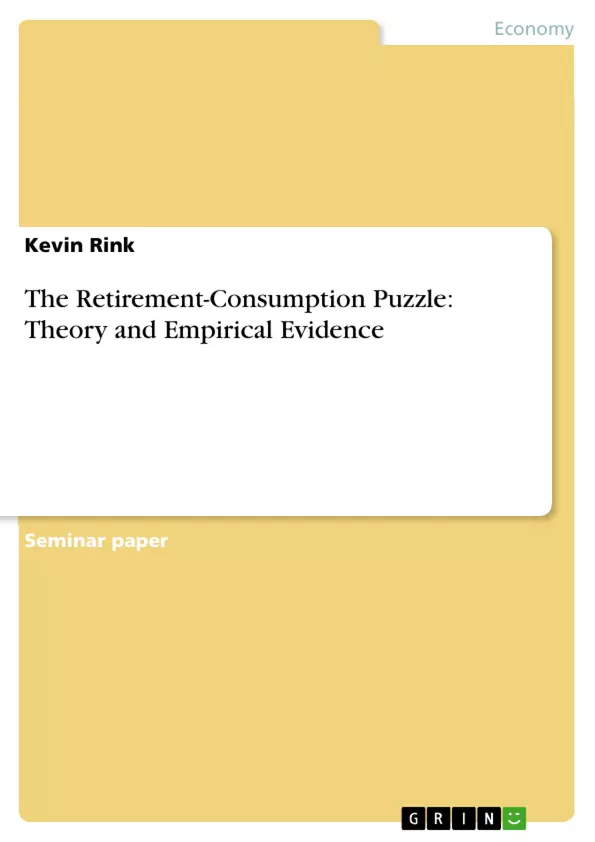The literature on consumption behavior finds that households consistently reduce consumption at retirement. It documents a consumption dip of between seven and 17% on average. However, according to life cycle theory, households smooth marginal utility of
consumption across time periods. The discrepancy between the predictions of theory and empirical findings is known as the retirement-consumption puzzle.
A deeper knowledge on retirement saving behavior is of interest for at least three reasons. First, it facilitates the testing of theoretical models like the life cycle hypothesis. Thereby, it helps to understand if and by how far individuals plan their retirement in a rational manner. Second,...
[...]
The task of this paper is to assess both theory and empirical evidence of the retirement consumption puzzle. It, therefore, discusses the basic characteristics of standard life cycle theory in section 2. Section 3 examines the main determinants of the puzzle and
perspectives from which the puzzle has been investigated. Section 4 concludes.
Inhaltsverzeichnis (Table of Contents)
- Introduction
- The Life Cycle Hypothesis
- The Stripped Down Life Cycle Model
- Consumption Smoothing
- The Retirement-Consumption Puzzle
- Household Characteristics and Life Cycle Consumption
- Wealth and Income
- Unplanned Events
- Decomposing Consumption
- Approaches to the Puzzle
- Substitution Effects
- Irrationality
- Critical Assessment
- Household Characteristics and Life Cycle Consumption
- Conclusion
Zielsetzung und Themenschwerpunkte (Objectives and Key Themes)
This paper aims to analyze both the theoretical and empirical evidence surrounding the retirement-consumption puzzle. It delves into the fundamental principles of the life cycle hypothesis and examines the main factors contributing to the observed discrepancy between predicted consumption patterns and real-world findings.
- The Retirement-Consumption Puzzle
- Life Cycle Hypothesis
- Consumption Smoothing
- Household Characteristics and Consumption
- Explanations for the Puzzle
Zusammenfassung der Kapitel (Chapter Summaries)
The paper begins by introducing the retirement-consumption puzzle, which describes the observed decline in consumption among retirees, a phenomenon seemingly at odds with the predictions of the life cycle hypothesis. It then delves into the core concepts of the life cycle hypothesis, including the stripped-down life cycle model and the concept of consumption smoothing. The next chapter focuses on the retirement-consumption puzzle itself. It explores the various factors that influence household consumption patterns throughout the life cycle, specifically considering wealth and income, unplanned events, and detailed consumption decomposition. Additionally, it examines different approaches to understanding the puzzle, including substitution effects and the role of irrationality in consumer behavior.
Schlüsselwörter (Keywords)
The primary keywords and focus topics of this paper include the retirement-consumption puzzle, life cycle hypothesis, consumption smoothing, household characteristics, substitution effects, and irrationality in economic behavior.
Frequently Asked Questions
What is the retirement-consumption puzzle?
The puzzle refers to the empirical finding that households significantly reduce their consumption upon retirement (by 7% to 17%), which contradicts the life cycle theory's prediction of consumption smoothing.
What does the life cycle hypothesis predict?
It predicts that rational individuals plan their spending over their entire lifetime to smooth the marginal utility of consumption, meaning they shouldn't have a sudden "dip" when retiring.
What are potential explanations for the consumption dip?
Explanations include substitution effects (e.g., more home production instead of buying services), unplanned events, or potentially irrational behavior in retirement planning.
Why is understanding retirement saving behavior important?
It helps test economic models like the life cycle hypothesis and informs policymakers about whether individuals are saving enough and planning rationally for their old age.
How do household characteristics influence the puzzle?
Factors such as wealth, income levels, and the decomposition of consumption categories play a significant role in how pronounced the dip is for different households.
- Arbeit zitieren
- Kevin Rink (Autor:in), 2011, The Retirement-Consumption Puzzle: Theory and Empirical Evidence, München, GRIN Verlag, https://www.grin.com/document/173049



